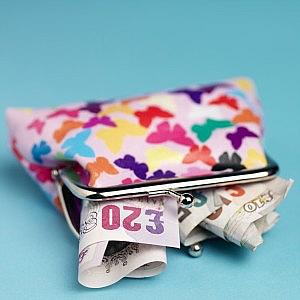Balancing the books
 I’ve been puzzling over a new survey today. Produced by American economists Daniel Sacks, Betsey Stevenson and Justin Wolfers, it links emotional well-being with wealth, proving – apparently – that the richer you are the happier you are.
I’ve been puzzling over a new survey today. Produced by American economists Daniel Sacks, Betsey Stevenson and Justin Wolfers, it links emotional well-being with wealth, proving – apparently – that the richer you are the happier you are.
On one level that has to be true – if you can’t afford to eat, shelter your family or keep up with the Joneses in the most basic way, then it’s very difficult to find the time, energy and wherewithal to pursue happiness.
But for the romantics among us, the thought of a direct link between cold hard cash and happiness goes a little against the grain. We’ve been brought up on fairy stories and pop songs that all preach the triumph of love over money. And of course, money can’t buy you love but, in the absence of fairy godmothers, it can pay for the cab to take you to the party and buy you the dress that bags you the prince. After that, though, you’re on your own.
It’s not money itself that makes us happy, but what money can protect us from that stops us feeling miserable. Of course we can all cite poor little rich girls and boys who end up hooked on drugs, drink or spending by having access to too much too soon, but being poor doesn’t protect you from addiction. There are far, far more penniless addicts than there are rich ones. And on balance, I’d rather be in the exclusive Priory having rehab than on the pavement.
But whatever happened to growing up poor but happy, like our grandparents did – or said they did? We’ve all heard the stories about growing up in houses with no central heating or mobile phones. But the common factor in most of those stories is that the children didn’t realise they were “poor” because all their friends and neighbours were in the same boat. It would only have taken one interloper flashing a shiny new Chopper bike to upset the home-made go-kart. And those memories are coloured by nostalgia, age and the security of knowing that things did indeed get better.
For almost all of us a bit more money in the pot brings more comfort and a bit less worry. I’m much happier this year than I was last because work has picked up and I’ve been able to afford to go on my teaching course. This time last year it wouldn’t have been an option.
So, on some level, money must increase happiness mustn’t it? At the very least it buys you the freedom of choice. It’s very difficult to opt out of the evil money-grabbing rat race and go and live in a croft to grow your own vegetables if you’re in debt up to your eyeballs. Remember The Good Life? Tom and Barbara Good could only afford to dig up the lawn once Tom had turned 40 and paid off the mortgage. Poor old Jerry next door was still paying for Margo’s Fortnum’s habit and was in thrall to Sir forever.
But does the ratio between money and happiness carry on forever? Won’t there come a time when you reach saturation point and money ceases to make any material or emotional difference to our lives and has no further influence on our happiness? Or was Wallis Simpson right? Can you really never be too rich or too thin?
I’d love to find out. Do you think those economists would let me be the guinea pig in their next controlled experiment? “How’s she doing Betsey?” “Sorry Justin. She’s still not smiling – give her another yacht.”
Let me know if money makes you happy.

One Response to Balancing the books
Leave a Reply
Please login or register to leave a comment.